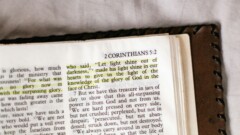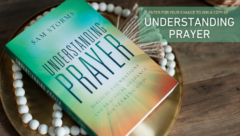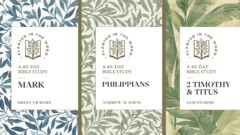
Today we come to another of our readings in Gresham Machen’s classic work Christianity & Liberalism. This week’s chapter looked to the Bible as the source of the truths we believe. Machen sought to show how liberalism’s understanding of Scripture is as much in error as their view of God and man (which was the topic of the previous chapter).
He begins with a wonderfully concise affirmation of all kinds of biblical truths.
The way was opened, according to the Bible, by an act of God, when, almost nineteen hundred years ago, outside the walls of Jerusalem, the eternal Son was offered as a sacrifice for the sins of men. To that one great event the whole Old Testament looks forward, and in that one event the whole of the New Testament finds its center and core. Salvation then, according to the Bible, is not something that was discovered, but something that happened. Hence appears the uniqueness of the Bible. All the ideas of Christianity might be discovered in some other religion, yet there would be in that other religion no Christianity. For Christianity depends, not upon a complex of ideas, but upon the narration of an event. Without that event, the world, in the Christian view, is altogether dark, and humanity is lost under the guilt of sin. There can be no salvation by the discovery of eternal truth, for eternal truth brings naught but despair, because of sin. But a new face has been put upon life by the blessed thing that God did when He offered up His only begotten Son.
There is a great danger in doing what many liberals sought to do–reduce the faith to mere experience, an experience of Christ. This was done, of course, at the expense of biblical authority.
The trouble is that the experience thus maintained is not Christian experience. Religious experience it may be, but Christian experience it certainly is not. For Christian experience depends absolutely upon an event. The Christian says to himself: “I have meditated upon the problem of becoming right with God, I have tried to produce a righteousness that will stand in His sight; but when I heard the gospel message I learned that what I had weakly striven to accomplish had been accomplished by the Lord Jesus Christ when He died for me on the Cross and completed His redeeming work by the glorious resurrection. If the thing has not yet been done, if I merely have an idea of its accomplishment, then I am of all men most miserable, for I am still in my sins. My Christian life, then, depends altogether upon the truth of the New Testament record.”
Says Machen, “Christian experience is rightly used when it confirms the documentary evidence. But it can never possibly provide a substitute for the documentary evidence.” Experience is important, but it can never be separated from the truths of Scripture or from Scripture itself.
Machen quickly moves from the Bible’s uniqueness as God’s revelation to its inspiration. After all, it would be possible to have a book that contains an account of a true revelation, even while being riddled with error. He offers up a brief defense of Scripture as an “infallible rule of faith and practice” but points out that, though verbal plenary inspiration is a crucial doctrine, there are some true believers that do not hold to it. He also points to the many liberals who say that, while they reject the authority of the Bible, they submit to the authority of Christ. This allows them to reject the God of the Old Testament and the sophistical arguments of Paul. But, says Machen, this cannot be. To reject the authority of the Bible is, in reality, to reject Christ for without the Old Testament background and without Christ’s arguments he has diminshed Christ’s entire purpose! With just a little bit of sarcasm Machen says,
Evidently, therefore, those words of Jesus which are to be regarded as authoritative by modern liberalism must first be selected from the mass of the recorded words by a critical process. The critical process is certainly very difficult, and the suspicion often arises that the critic is retaining as genuine words of the historical Jesus only those words which conform to his own preconceived ideas. But even after the sifting process has been completed, the liberal scholar is still unable to accept as authoritative all the sayings of Jesus; he must finally admit that even the “historical” Jesus as reconstructed by modern historians said some things that are untrue.
In summary, the Christian “finds in the Bible the very Word of God. Let it not be said that dependence upon a book is a dead or an artificial thing. The Reformation of the sixteenth century was founded upon the authority of the Bible, yet it set the world aflame. Dependence upon a word of man would be slavish, but dependence upon God’s word is life. Dark and gloomy would be the world, if we were left to our own devices and had no blessed Word of God. The Bible, to the Christian is not a burdensome law, but the very Magna Charta of Christian liberty.”
This was a good chapter; a short chapter, but a compact and powerful one, jam packed with truth.
Next Week
For next week please read chapter 5, “Christ.”
Your Turn
The purpose of this program is to read these books together. So if you have something to say, whether a comment or criticism or question, feel free to use the comment section for that purpose.
Note: If you are mentioning Reading Classics Together on Twitter, we’ve got the hashtag #rctmachen set aside for that purpose.









